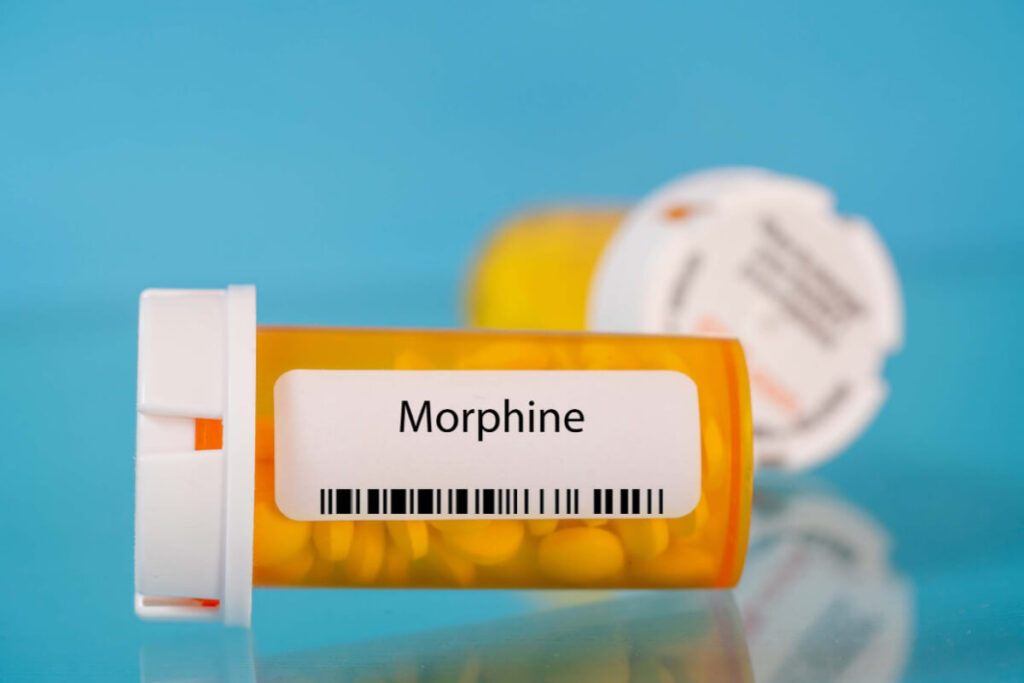Morphine Tablet 10 mg
Description
Morphine 10 mg is an oral tablet containing Morphine Sulfate, a potent opioid analgesic (pain reliever). It belongs to the class of opioid agonists and acts primarily on opioid receptors in the brain and spinal cord to significantly reduce pain perception. This strength is typically used for moderate to severe pain that is not adequately controlled by non-opioid pain relievers.
Advantages
- Powerful Pain Relief: Highly effective for managing moderate to severe acute and chronic pain.
- Versatile Application: Can be used for various types of pain, including post-surgical pain, cancer pain, and pain from injuries.
- Well-Established: A long history of clinical use provides extensive understanding of its effects and management.
- Oral Convenience: Tablet form allows for relatively easy administration for ongoing pain management.
Uses
Morphine Tablet 10 mg is primarily used for:
- Management of Moderate to Severe Pain: Indicated for the relief of pain that is severe enough to require an opioid analgesic and for which alternative treatments are inadequate. This includes:
- Post-operative pain
- Cancer pain
- Pain from severe injuries or chronic debilitating conditions.
Nature
Morphine is a natural opioid alkaloid derived from the opium poppy. It acts as a full agonist primarily at the mu (μ) opioid receptors in the central nervous system (brain and spinal cord), as well as to a lesser extent at kappa (κ) and delta (δ) receptors.
Its mechanism of action involves:
- Binding to Opioid Receptors: When morphine binds to these receptors, it mimics the effects of endogenous opioids (like endorphins).
- Inhibition of Pain Signal Transmission: This binding leads to a cascade of cellular events that inhibit the transmission of pain signals from the peripheral nervous system to the brain and within the central nervous system.
- Modulation of Pain Perception: It also alters the brain’s perception of pain, reducing the emotional distress and suffering associated with pain.
- Other CNS Effects: Beyond analgesia, morphine can cause sedation, euphoria, respiratory depression, and suppress the cough reflex.
Storage
- Room Temperature: Store Morphine 10 mg tablets at controlled room temperature, typically between 20°C to 25°C (68°F to 77°F).
- Protect from Light and Moisture: Keep the tablets in their original, tightly closed, light-resistant container, away from direct light, heat, and excessive humidity. Do not store in the bathroom or near a sink.
- Secure Storage (Controlled Substance): Due to its high potential for abuse and dependence, Morphine is a controlled substance. Store it in a very secure location, locked if possible, and completely out of sight and reach of children, pets, and anyone for whom it is not prescribed.
- Do Not Freeze: Freezing can compromise the integrity and effectiveness of the tablets.
- Check Expiry Date: Do not use the medication after the expiry date printed on the packaging. Properly dispose of any expired or unused medication according to local pharmacy or government guidelines for controlled substances (e.g., drug take-back programs).
Patient Advice
Important: Always take Morphine exactly as prescribed by your doctor. Do not change your dose or stop taking it without consulting your healthcare provider.
- Take Exactly as Prescribed: Never take more than your prescribed dose, and do not take it more often than prescribed. Taking too much can lead to serious side effects, including overdose and death.
- Do Not Share: Never share your Morphine with anyone else. It is a powerful medication and could be very dangerous for someone else, especially if they have not been prescribed it.
- Swallow Whole: Swallow the tablet whole. Do not crush, chew, break, or dissolve it, as this can lead to rapid release of the drug and a potentially fatal overdose.
- Avoid Alcohol: Do not consume alcohol while taking Morphine, as this can significantly increase drowsiness, dizziness, and the risk of serious breathing problems.
- Avoid Other Sedatives: Be extremely cautious with other medications that cause drowsiness, such as tranquilizers, sleeping pills, other pain medications, or muscle relaxants. Inform your doctor about all other medications you are taking.
- Drowsiness/Dizziness: Morphine can cause significant drowsiness, dizziness, or lightheadedness. Avoid driving, operating heavy machinery, or performing any activities that require mental alertness until you know how this medication affects you.
- Constipation: Constipation is a very common side effect. Discuss strategies with your doctor or pharmacist to manage it (e.g., increasing fiber and fluids, using laxatives).
- Nausea/Vomiting: Nausea and vomiting can occur, especially when starting the medication. Your doctor may prescribe an anti-nausea medication.
- Tolerance and Dependence: With continued use, your body may become used to the medication (tolerance), and you may develop physical dependence. This is a normal physiological response. Do not suddenly stop taking Morphine, as this can lead to withdrawal symptoms. Your doctor will provide a plan for gradual reduction if discontinuation is necessary.
- Respiratory Depression: A serious side effect is slow or shallow breathing. If you or someone with you experiences very slow or shallow breathing, extreme drowsiness, dizziness, or difficulty waking up, seek immediate emergency medical help.
- Store Securely: Keep this medication in a locked cabinet or a very secure place, out of reach of children, pets, and anyone else. Accidental ingestion, especially by children, can be fatal.
- Proper Disposal: When you no longer need this medication, or if it expires, dispose of it properly according to local guidelines for controlled substances (e.g., drug take-back programs, mixing with undesirable substances like coffee grounds/cat litter and sealing in a bag before discarding). Do NOT flush down the toilet.
- Report Concerns: If you experience any severe side effects, unusual symptoms, or if your pain is not well controlled, contact your doctor immediately.

